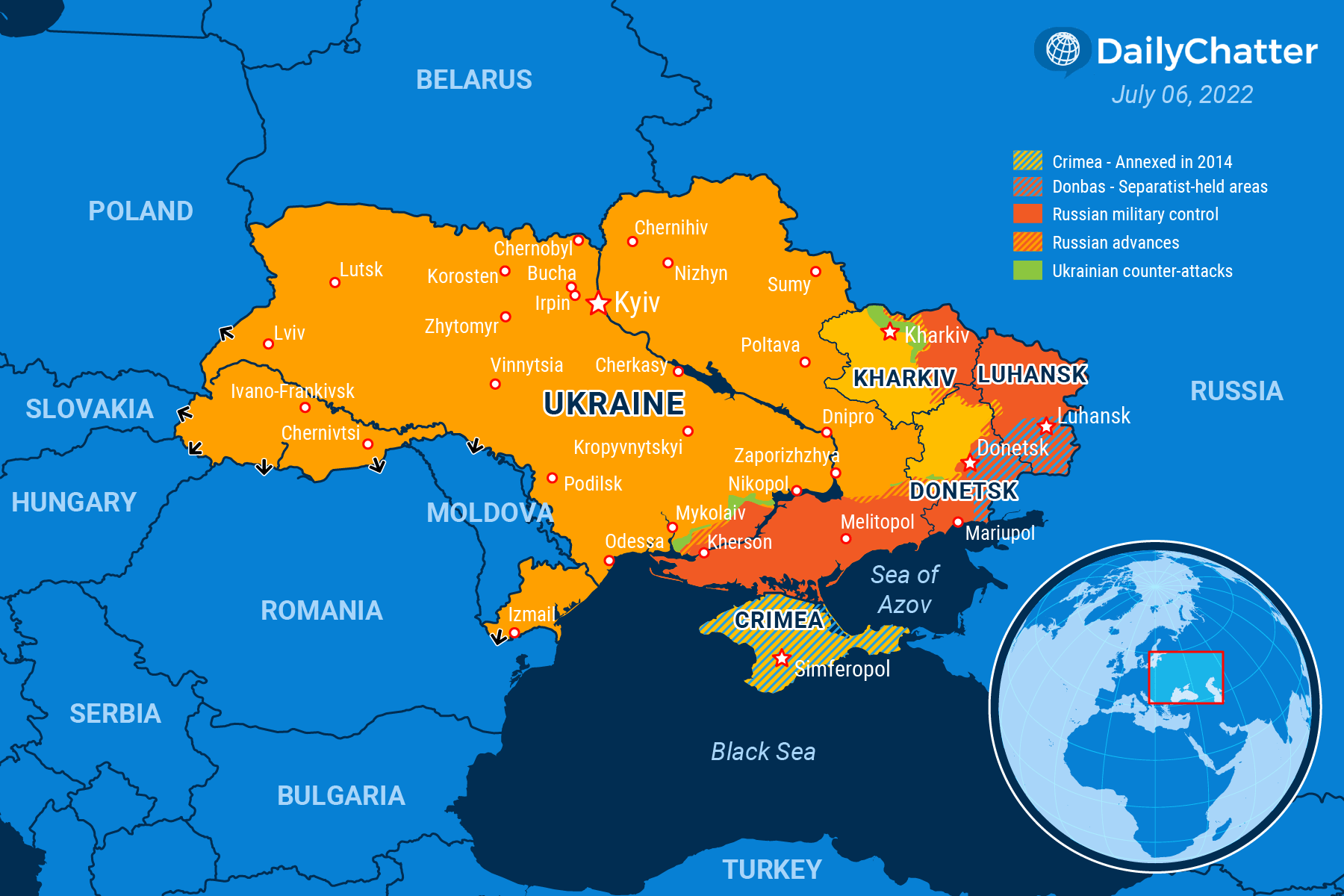
The World Today for August 22, 2022
NEED TO KNOW
A Changing Country
UKRAINE

Before Russia’s invasion of Ukraine in February, Ukraine had 40 million people. Now it is 6.7 million short.
Those missing millions have crossed the border, to Poland, to Romania, to Hungary, to safety. But that is only part of the story: Inside of Ukraine, six to 10 million people have shifted, fleeing the bombs and the fighting and the desperation for quieter parts of the country.
As a result, east is becoming west, north is becoming south and everything in between is getting all mixed up.
Hundreds of thousands of people, for example, have fled the heavily industrialized deeply Russian-influenced south and east for Transcarpathia, an agricultural region in western Ukraine, which has remained relatively unscathed by the war – by bombs and fighting, at least.
But this region, known for its verdant hills, small villages, central European culture and the Hungarian minority, has seen its population balloon by more than a third, according to the Washington Post.
And along with people come their skills, their attitudes and also their businesses – 350 enterprises have relocated to the region since March. Some of these employees, especially from the east, are still adjusting to the silence and the singing of birds that replaced the daily sound of bombs.
One manufacturer, the newspaper wrote, became the first to recycle in the region. Locals are thrilled.
And before the war, the region had about 2,000 computer scientists. Now it has more than 30,000, with the region’s leadership discussing transforming the area into a new Silicon Valley.
Across the country, as Transcarpathia grows, Nova Kakhovka shrinks. People have been escaping the city even as others hold on.
The city, in southern Ukraine, was occupied by Russian troops almost six months ago. It’s run by Russian-backed separatists, it’s likely to be annexed by Russia, and it’s also being targeted by Ukraine in its new offensive to take back areas lost to Russia, Politico wrote.
Those who remain say they have already felt as if they have gone backward in time, pointing out a new statue of former Russian Communist leader Vladimir Lenin and the new Russian and Soviet flags in the city. The Russian currency is used here now, along with Russian SIM cards, Russian-hosted internet services and Russian passports. The Ukrainian curriculum is slated to be changed to a Russian one soon.
Town officials say it’s a relief to finally be able to embrace the local identity officially.
But some residents take issue with that sentiment. And they complain that Ukrainian goods have disappeared from stores only to be replaced with poor-quality Russian ones.
“They haven’t returned us to Russia like they like to say – they’ve sent us back to the USSR of 40 years ago,” a teacher in the city told Euractiv.
“We’re waiting for the Ukrainian army,” she added. “I don’t know how it’s going to happen and where we’ll hide and what we’ll lose, but we want to be in Ukraine.”
In the heavily industrialized east and south, especially in the Donbas region, many areas are now battered and empty – Donbas alone has lost half of its six million people since the invasion began in February, the New York Times wrote. This region has long been more Russian than Ukrainian in language and culture because of centuries of rule by the Russian empire and, later, the Soviet Union.
Now, as Russia continues to employ its “scorched earth” policy on this region it wants to annex, as Bloomberg wrote, some are rejecting their own culture, especially the Russky Mir (Russian World) concept – the pretext Russian President Vladimir Putin uses to invade Ukraine.
Svitlana Panova, an IT manager who fled Crimea to the eastern city of Kramatorsk after it was annexed by Russia in 2014 and then fled from there to Lviv in the west recently, said she is rejecting her native tongue, Russian, after losing her home – twice.
“Russia left me without my home, without my family,” she told NPR. “It’s hard for me to switch to Ukrainian but I will learn it for sure.”
One-third of Ukrainians speak Russian as their mother tongue. But classes that offer Ukrainian are filling up fast. One launched recently had 800 people sign up from all regions in the country in three days, the broadcaster noted, forcing it to close registration.
For many of these Ukrainian students, changing one’s mother tongue is about more than language or culture. It’s about rejecting a bully, about unity, about the nation itself, however it will look when people stop shifting, when missiles stop falling, and when all of this is over.
To read the full edition and support independent journalism, join our community of informed readers and subscribe today!
Not already a subscriber?
If you would like to receive DailyChatter directly to your inbox each morning, subscribe below with a free two-week trial.
Support journalism that’s independent, non-partisan, and fair.
If you are a student or faculty with a valid school email, you can sign up for a FREE student subscription or faculty subscription.
Questions? Write to us at [email protected].
